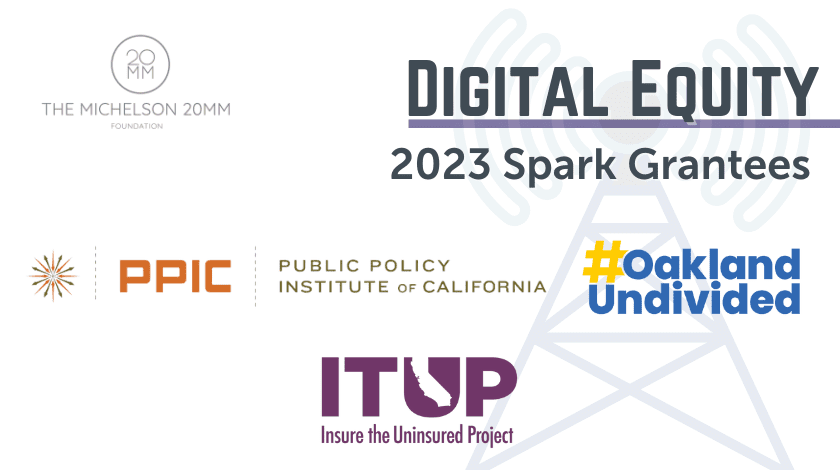News and Announcements
Get to Know the 2023 Digital Equity Spark Grantees
Published Date
- May 10, 2023

As the federal COVID-19 public health emergency nears its end, the Michelson 20MM Foundation remains steadfast in our commitment to close the digital divide by advocating for paradigm-shifting policies and convening cross-sectoral leaders to increase investments into innovative solutions. This commitment includes providing just-in-time funding for scalable efforts that help close the digital divide in California through the 2023 Digital Equity Spark Grants funding cycle.
Guided by our three Spark Community Advisors, the 2023 Digital Equity call for proposals sought California-based efforts that further the following focus areas:
- Digital Equity as a Social Determinant of Health: Efforts that address digital inequity through its impact as a social determinant of health that can be a promising practice to be scaled across the state. This includes higher education, healthcare/public health, economic opportunity, and civic engagement.
- Eliminating Digital Discrimination: Projects that highlight the needs and uplift the voices of historically digitally redlined and underserved communities in California, including helping address the impact that inadequate broadband has in areas that may superficially appear to be served. Efforts may also include those that provide tools to combat digital discrimination and to promote equal access to broadband throughout California.
- Policy Advocacy and Civic Engagement: Efforts that increase civic participation in digital equity policy-making and regulatory processes at the local, regional, or state-level (including the education of state policy-makers on key digital equity issues). This may include efforts focusing on education, capacity-building and the equitable implementation of digital equity policy.
- Digital Equity in Tribal Communities: Projects that help Tribal Communities bridge the digital divide. This may include but isn’t limited to education, capacity-building, and workforce development.
After a competitive call for proposals, we are pleased to welcome three 2023 Digital Equity Spark Grantees whose projects will advance the above focus areas!
Insure the Uninsured Project (ITUP) is a leading health policy organization focused on promoting innovative and effective policy solutions to improve access to equitable, quality, and timely health care for all Californians. California’s State Digital Equity Plan (SDEP) will drive allocations of the forthcoming federal Broadband Equity, Access, and Deployment (BEAD) funding, ITUP—in partnership with the California Department of Technology—will work to facilitate health care participation in SDEP planning. Through educational workshops, ITUP will engage a network of health care and health policy leaders in identifying and breaking down digital barriers to health, while promoting a more equitable and accessible health care delivery system.
Recognizing disparities between speeds advertised and speeds received, #OaklandUndivided will work with Exactly Labs to provide devices that measure the bandwidth delivered to these homes as well as latency spikes and outages. In addition to data points often included in a speed test, #OaklandUndivided will also collect the costs of service to analyze if individuals are receiving the speeds promised. At the same time, together with Reid Consulting Group LLC, #OaklandUndivided will analyze 57 million California speed tests from all Internet Service Providers this year. The maps will include household census data and can be overlaid on other demographic and socioeconomic datasets. #OaklandUndivided will also highlight the discrepancies between these maps and the Federal Communications Commission’s CostQuest Map to demonstrate the need for more accurate mapping. This will inform federal spending, particularly since the existing maps fail to prioritize Oakland’s marginalized populations.
The Public Policy Institute of California will continue to monitor and track SB 156 implementation by: 1) Tracking local efforts to expand broadband infrastructure, improve affordability, and promote digital literacy/inclusion via a survey with key contacts across the state and; 2) Understanding the disparities in CPUC funding programs. The proposed research will continue to lay a strong foundation for a future evaluation study to examine the effects of the landmark SB 156. Their research will both center and amplify the voices of historically marginalized communities by ensuring the survey reflects these communities and also by conducting additional outreach to them.
We are excited to share the outcomes of these three projects as we work to close the digital divide!
Michelson 20MM is a private, nonprofit foundation seeking to accelerate progress towards a more just world through grantmaking, operating programs, and impact investing. Co-chaired and funded by Alya and Gary Michelson, Michelson 20MM is part of the Michelson Philanthropies network of foundations.
To sign up for our newsletter, click here.